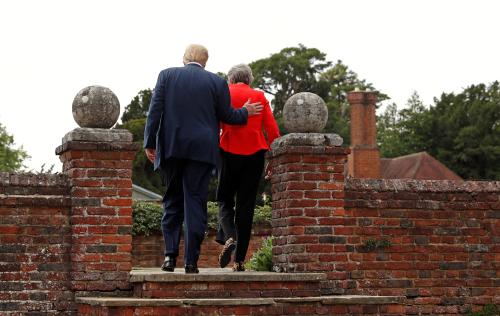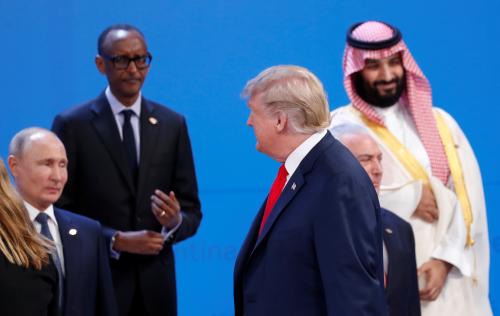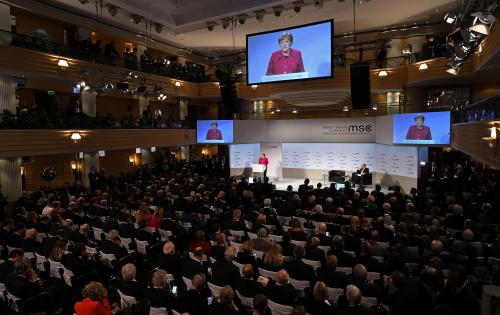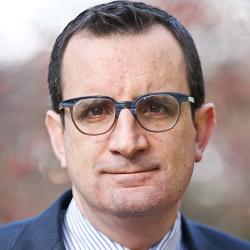The 10-day period from June 20—when President Trump reversed himself on Iran strikes—to the DMZ visit was among the most significant of his presidency, as he was forced to come to terms with the consequences and contradictions of his own decisions. This piece originally appeared in The Atlantic.
Vyacheslav Molotov served in senior positions in the Soviet Union for more than a quarter century, including 10 years as Stalin’s foreign minister. He was dismissed in 1949 when he fell out of favor with Stalin, but he found his way back in to the Foreign Ministry after the dictator’s death in 1953. Over the next four years, he fought with the new Soviet leader, Nikita Khrushchev. According to Molotov’s biographer, Geoffrey Roberts, Khrushchev “accused Molotov of being a dogmatist whose actions as foreign minister had united the USSR’s imperialist enemies.” The Soviet plenum passed a resolution that charged Molotov with opposing measures “to reduce international tension and strengthen world peace.” Molotov was dismissed from his post and named ambassador to Outer Mongolia (what is now independent Mongolia). This role wasn’t unimportant, and his fate was sweeter than those of Khrushchev’s other party rivals—Georgy Malenkov was made to manage a power station in Kazakhstan and Lazar Kaganovich a potash factory in the Urals. Even so, Molotov was far, far from the action. Banished to Outer Mongolia quickly entered the English lexicon.
On June 30, another mustachioed foreign-policy chief found himself in Outer Mongolia. John Bolton was sent to the capital, Ulaanbaatar, while President Donald Trump stepped into North Korea to meet Kim Jong Un. Trump was accompanied by loyalists—Mike Pompeo, Mick Mulvaney, Jared and Ivanka Trump—and a new adviser, Fox News’s Tucker Carlson, who is credited with talking the president out of striking Iran as his Cabinet had recommended. Trump invited Kim to the White House, and reports swirled that the United States would settle for a nuclear freeze by North Korea instead of denuclearization. In response, Bolton tweeted, “Neither the NSC staff or I have discussed or heard of any desire to ‘settle for a nuclear freeze by North Korea.’ This was a reprehensible attempt by someone to box in the President. There should be consequences.” The words NSC staff or I were doing a lot of work, implying that others in the administration were behind the move. We now know that Stephen Biegun, the State Department’s special envoy to North Korea, briefed reporters on Pompeo’s plane back from Korea that the administration was considering a “complete freeze” to unlock the talks.
Trump’s foreign policy has been full of twists and turns, but it has also followed a clear narrative arc. The 10-day period from June 20—when Trump reversed himself on Iran strikes—to the DMZ visit was among the most significant of his presidency, as he was forced to come to terms with the consequences and contradictions of his own decisions. Over the course of three decades, Trump has carefully nurtured two images of himself—as a dealmaker, and as a militarist. Bolton did all he could to encourage the latter. But even from faraway Ulaanbaatar this past weekend, it was clear that, when made to choose, Trump would opt for the former.
To understand where we are and where we are going, we must first understand where we have been. Trump became president with a set of deeply rooted visceral instincts about the world—hostility to alliances, skepticism of free trade, and support for authoritarian strongmen—but little idea about how to convert these beliefs into policy. He had few advisers qualified for high office who believed what he believed. He was insecure. And so he turned to a number of highly experienced businessmen and former military officers to fill key national-security and foreign-policy positions—John Kelly, James Mattis, H. R. McMaster, Gary Cohn, and Rex Tillerson. These men saw their role as constraining the president, not empowering him. They measured their success by what they prevented from happening, rather than by what they made happen. In the Trump epoch, this was the age of constraint.
The president did not always listen to the “axis of adults.” In fact, he took pleasure in defying them on occasion, but he usually returned to the fold under pressure. While delivering a speech at the new NATO headquarters in May 2017, Trump raised doubts about his commitment to the alliance when he took out a sentence endorsing Article 5, the mutual-defense clause of the NATO charter. After the ensuing uproar, he was persuaded to state his support for Article 5 at a press conference with the Romanian president and in a subsequent speech in Poland. Under the leadership of the axis of adults, the administration produced strategic documents reflecting the views of the establishment.
The president grew weary of the adult supervision and he gradually realized that he was the president. He could order his Cabinet members to do what he wished, even if they all objected. We can identify precisely when the age of constraint reached its peak and when it ended. The peak came on July 17, 2017, when the president sat in an interagency meeting to discuss the Iran nuclear deal—specifically the question of whether to recertify Iran’s compliance, an assessment that the United States was required to make every six months. Trump’s team presented him with three options, none of which involved leaving the deal. Trump was furious—he approved a recertification but promised that it would be the last one. By the next deadline, he wanted the option to leave. Bolton immediately began auditioning for the job as Trump’s top security adviser, writing an article in National Review that laid out a plan to leave the Iran deal.
For the next few months, it was clear that Trump was intent on a change. He forced out the axis of adults, replacing Tillerson, Cohn, and McMaster with individuals who placed loyalty to the president over their own independent judgment. This ushered in the second phase of his presidency—the age of action. Trump now acted more freely, pursuing his instincts even when they conflicted with the advice of his officials. He announced talks with Kim Jong Un without consulting his Cabinet. He moved the U.S. embassy in Israel to Jerusalem. He pulled out of the Iran nuclear deal. He imposed tariffs on steel and aluminum. He had a summit with Russian President Vladimir Putin in Helsinki. He started a trade war with China. His national security adviser, Bolton, effectively abolished the interagency process through which the Pentagon, State Department, CIA, and other entities have formal seats at the table where decisions are made. The removal of constraints was complete when Mattis resigned in December 2018 following Trump’s promise to withdraw troops from Syria.
For Trump, the age of action was exhilarating. It fulfilled his expectations of what it meant to be president. But it couldn’t last forever. His actions were always focused on the short term. They were frequently riven with contradictions. There never was an end goal or a strategy for how to get there. The United States is a very powerful country. It can make mistakes for some time without incurring the costs that normal powers would experience if they pursued the same path. But it cannot do so indefinitely.
The age of reckoning finally arrived on June 21, when Trump ordered air strikes on Iran and then changed his mind. At this moment, the contradictions in his Iran policy were laid bare. Trump wanted to shred the Iran nuclear deal and impose maximum pressure on the Iranian regime. He also wanted to avoid embroiling America in a new conflict in the Middle East. He could not have both. But for more than a year, he pretended as if these two goals were not in conflict. Perhaps he believed the Iranians would surrender without a fight. Or that they would come to the negotiating table from a position of weakness. Or perhaps he did not think about the endgame at all until he had to.
For all his own flaws, Trump was not well served by his national security team. The axis of adults manipulated Trump by delaying, blocking, or blunting his requests. Bolton manipulated him by advocating for the most extreme options—such as imposing secondary sanctions on European countries to truly destroy the Iran nuclear deal, and pulling out of the Intermediate Range Nuclear Forces Treaty—when more modest ones would have sufficed. Bolton’s priority has always been to advance his unilateralist theory of international law, and he seems unable to think strategically about America’s interests.
It has been obvious for months that Trump did not want war with Iran, but Bolton kept the president from hearing from officials who would offer a contrary view to the hawks. Never one for protocol, Trump decided to go outside normal channels and started talking with Carlson, who now appears to be a confidant. It says a lot about Bolton’s own insecurity that he would prefer to put his boss in the position of relying on a talk-show host rather than allow an interagency meeting where a diversity of views might be raised.
In the reckoning, there is some clarity. It is now clear that Trump wants talks with Iran, just like with North Korea. Calling off the strikes was the right judgment call, but things should never have gotten to that point. Foreign governments now know what makes Trump tick. Pyongyang, Moscow, Beijing, Tehran, and others are no doubt taking copious notes. Trump’s team will be tempted to correct course—as it did by imposing tough new sanctions in the days after the Iran-strike decision—but the damage is done.
The contradictions are catching up with Trump elsewhere. The DMZ summit confirmed that, if forced to choose between denuclearization and a good relationship with Kim Jong Un, he will choose Kim. In Venezuela, he was told that forcing Nicolás Maduro out of power would be an easy win. It was not. Faced with the choice between escalation and intervention on the one hand and disengagement on the other, he admonished his hawkish aides and chose the latter course. He was right not to intervene, but once again a crisis had reached a point it shouldn’t have.
On China, Trump embraced foreign-policy hawks to create leverage that would compel Beijing to reach a trade deal. However, it looks like he has to choose between an agreement and efforts to counterbalance Chinese power. In Osaka, he chose to keep the deal alive and reversed his decision to ban American companies from providing Huawei with technology. As time goes on, he may continue to prioritize economic gains over strategic concerns.
The era of action ultimately forced Trump to choose dealmaking over militarism. He could change his mind in the future—particularly if he thinks he will look weak for not responding to new provocations, real or perceived—but the frame for the next 18 months appears to be set. A former senior official in the George W. Bush administration who is sympathetic to Bolton on some issues told me that Trump is so wrapped up in the image of a dealmaker, yet so ignorant of the issues, that he will “sign on to half-assed deals that he does not understand.” Referring to Iran, he said, “Does anyone think Pompeo’s strict conditions and objectives for negotiations will remain in place” once Trump gets involved? When a business deal that Trump made as a developer turned sour, he would go to court for a do-over. But taking a foreign-policy risk is different. As the former Bush official pointed out, the president has “no option of taking the country into Chapter 11 bankruptcy proceedings if it doesn’t work out.” By the time the bill comes due, the 2020 election will probably be over, so he’s unlikely to care.
Trump will still act freely in accordance with his own instincts on other fronts. It was obvious in Osaka that his heart is with other authoritarian leaders. He embraced Saudi Crown Prince Mohammed bin Salman and joked with Putin about Russian election interference. He did not know what Putin meant by his comment that Western liberalism is obsolete, and didn’t care to find out. Meanwhile, U.S. relations with the United Kingdom, Germany, and Japan are at post–Cold War lows. It is often, and rightly, said of Trump that he is undisciplined and loses interest in subjects quickly. But he has slowly and steadily chipped away at the pillars of the free world and used the rubble to lay the foundations of an illiberal alternative.
As during the previous twist in the narrative, Trump now finds himself with a national-security team out of sync with his preferences. Changes are inevitable. Pompeo will likely survive. He is nothing if not adaptable. After the Iran decision, he and Vice President Mike Pence let it be known that although they supported military action, they were equally enthusiastic about the president’s U-turn. It’s hard to see how Bolton can stay. Trump has long known that Bolton wants war more than he does. He sidelined him on North Korea and overruled him on Iran. For his part, Bolton has privately attacked Pompeo, long a Trump favorite, as falling captive to the State Department bureaucracy and has predicted that the North Korea policy will fail.
Bolton has given an unusually large number of interviews to reporters and has been rewarded with positive profiles lauding his influence and bureaucratic prowess. Those of us who predicted that he would cling to the post of national security adviser, as it would be the last job he’d ever get, may have been wrong. In fact, Bolton looks and sounds as if he is preparing to exit on his own terms. Better that than being sent on a never-ending tour of the world’s most obscure places. For Bolton, leaving because he’s too tough for Trump is the perfect way to save face. Otherwise, he may be remembered as the man who presided over one of the weakest national-security teams in modern American history and someone whose myopic obsessions—such as international treaties and communism in Venezuela—meant the United States lost precious time in preparing for the national-security challenges of the future.
Who will replace Bolton is unclear. The best-case scenario would be Biegun, the North Korea envoy. He was rumored to be the runner-up to Bolton for the post in 2018. (Mattis and Kelly pushed for him, although at that point he had not spent time with Trump. Now he has.) Trump may see him as the man to oversee his various negotiations, as he has on North Korea. But will Trump go for a mainstream figure who would not be out of place in a traditional Republican presidency?
If the past is prelude, Trump may turn instead to his favorite source of information, Fox News, just as he did for Bolton. One of Tucker Carlson’s frequent guests on his show is a retired Army colonel by the name of Douglas Macgregor. Macgregor served in the first Gulf War and appears to be ideologically aligned with Carlson, favoring retrenchment from the Middle East and good relations with authoritarian states. His appointment would be treated as a calamity by the Republican foreign-policy establishment—which is one reason it may appeal to the president. Appointing a cheerleading cable-news commentator to one of the nation’s most senior posts sounds ludicrous, but—as Carlson’s recent role demonstrates—it is the way we live now.
One way or another, Trump seems determined to present an image of himself in 2020 as a dealmaker who is getting tough with allies who have taken advantage of the United States and making peace with the country’s enemies. The risks are enormous. Trump may strike bad deals. He could permanently weaken America’s influence and encourage aggression against allies. But it may work for him politically, throwing the Democrats off balance and setting the stage for a second term in which he will be empowered to follow his instincts to their logical conclusion. The bullets Trump never fired in his first term—such as withdrawal from NATO and the World Trade Organization—may be put back in the chamber. The 75-year-old American-led international order will be back in his firing line. Men like Pompeo may tell themselves they can steer him in a different direction. But if they finally stand up to him, they may find themselves with urgent business to attend to in Ulaanbaatar or, worse still, at a potash factory in the Urals.








Commentary
Trump couldn’t ignore the contradictions of his foreign policy any longer
July 6, 2019